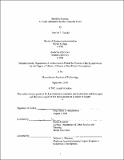Synthetic leasing : a viable alternative for the corporate user
Author(s)
Cookke, Jennifer F. (Jennifer French), 1966-
DownloadFull printable version (3.895Mb)
Other Contributors
Massachusetts Institute of Technology. Dept. of Architecture.
Advisor
Sandra Lambert.
Terms of use
Metadata
Show full item recordAbstract
Synthetic leasing is a method used to provide off-balance sheet financing to a corporate entity for the acquisition and development of a commercial real estate asset. Recently, off-balance sheet transactions, specifically synthetic leases, have proliferated in connection with corporate acquisitions and with construction and development of corporate real estate facilities. Under synthetic leasing, the lease is treated as an operating lease for accounting purposes; however, for federal income tax purposes, the company will be deemed the owner of the property, thus offering the corporate user what appears to be the best of both leasing and ownership. Are synthetic leases all that they claim to be? Do they offer the user an advantageous hybrid of the ownership versus leasing options? And what are the risks and potential drawbacks of these lease types? This thesis examines each of these questions as part of the overall analysis of synthetic leases and their use within the corporate real estate setting. Research material is derived from two sources; existing research and writings of the topic, and personal interviews and case examples from three US corporations using synthetic leases. The conclusion that the work leads to is that synthetic leases are indeed an authentic means of structuring real estate to derive cost savings, improved financial ratios and preservation of company resources. However, the benefits are very situation- dependent and must be used after a thorough evaluation of all of the other transaction options.
Description
Thesis (S.M.)--Massachusetts Institute of Technology, Dept. of Architecture, 2001. Includes bibliographical references (p. 62-63).
Date issued
2001Department
Massachusetts Institute of Technology. Department of ArchitecturePublisher
Massachusetts Institute of Technology
Keywords
Architecture.